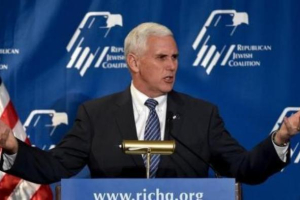Indiana Governor Mike Pence has the best interests of the residents of Indiana in mind when he joined a move among many other governors in the nation to block Syrian refugees from entering the US. The Catholic Archdiocese of Indianapolis, however, isn't seeing eye-to-eye with the Governor.
Pence feels that he has a valid argument in refusing to let refugees settle in Indiana after the Paris attacks. In a discussion that he had with Indianapolis Archbishop Joseph Tobin, Pence said that he felt that they, "had a good conversation."
The two had discussed the concerns they had about compassion for Syrians who are just trying to escape the violence of their war-torn country and the security of the people of America. The problem is discerning whether or not Syrians who are wanting to come to America are indeed fleeing, or if they are terrorists in disguise who are comparable to wolves in sheep's clothing.
Pence released a statement in which he said, "The governor holds Catholic Charities in the highest regard but respectfully disagrees with their decision to place a Syrian refugee family in Indiana at this time.
Before the terrorist attacks in Paris, which involved a Syrian refugee as one of the attackers, the Obama Administration's own FBI Director said there are 'gaps' in the Syrian refugee resettlement program.
Yesterday, the Chairman of the U.S. House Homeland Security Committee stated that 'The U.S. government has information to indicate that individuals tied to terrorist groups in Syria have already attempted to gain access to our country through the U.S. refugee program.'
Despite these facts, the Administration continues to ignore calls from governors of both parties, as well as a bipartisan majority in the U.S. House, to pause and strengthen the program.
The safety and security of the people of Indiana are Governor Pence's top priority. The State of Indiana will continue to suspend its participation in the resettlement of Syrian refugees in Indiana until the federal government takes action to address the concerns raised about this program."
The Indianapolis Archdiocese is insistent on continuing its "40-year tradition" of "helping people fleeing violence from various parts of the world."
While it has not yet been specifically stated whether or not the family that the Archdiocese settled on Monday is Christian or not, there is a principle here to be observed: since America's beginnings, Christians have been "filling in the gaps" where government involvement is concerned.
For example, before the implementation of the Social Security system, it was the donations from those who were a part of Christian churches that took care of the elderly, disabled, orphaned and widowed. Those donations were also used to provide food for the hungry, and shelter for the homeless. Then Social Security was created, which has likely developed into something that has drifted pretty far away from what Roosevelt was initially thinking.
Today, there are still Christian organizations that, through the donations of fellow Christians, feed the hungry through Christian soup kitchens or food pantries. There are also Christian organizations that, through the donations of fellow Christians, provide the homeless with a place to sleep, and in some cases, even try to help them to get their GED and a job.
There are many Christian organization today that also focus on reaching out to persecuted Christians in the 10/40 window. These Christian mission organizations are very well connected in the countries within that window, or they would not be able to send their missionaries to those places to help the persecuted. Many of those Christian organizations also help Christian refugees with resettlement.
Most Syrian Christians are not coming through the UN and then routing into America because they can be too easily persecuted or killed by Muslims. Perhaps it's time for the American government to reach out to Christian ministries who already have many of the needed connections outside of the UN, let them fill in the government's gaps, and let the church be the church.

















